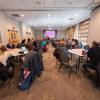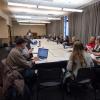Workshops & Seminars
 Graduate students and postdocs, join Cat Diebel-Wilson from Career Services on Sept. 27 for a workshop on resumes and networking, just in time for fall career fairs.
Graduate students and postdocs, join Cat Diebel-Wilson from Career Services on Sept. 27 for a workshop on resumes and networking, just in time for fall career fairs. Register for an upcoming Transfer Advocate 101 or Transfer Advocate 201 training to learn how you can best support transfer Buffs.
Register for an upcoming Transfer Advocate 101 or Transfer Advocate 201 training to learn how you can best support transfer Buffs. This six-hour course, including first aid certification, covers everything from burns and broken bones to choking and heart attacks. The course includes adult, infant and junior CPR and external defibrillator training. Register today—open to CU Boulder affiliates only.
This six-hour course, including first aid certification, covers everything from burns and broken bones to choking and heart attacks. The course includes adult, infant and junior CPR and external defibrillator training. Register today—open to CU Boulder affiliates only. Change and transition can feel overwhelming. During this one-hour workshop, attendees will learn about their relationship with change. Learn ways to manage current and incoming changes and transitions related to work, relationships and everyday life.
Change and transition can feel overwhelming. During this one-hour workshop, attendees will learn about their relationship with change. Learn ways to manage current and incoming changes and transitions related to work, relationships and everyday life. Grounded in a growth mindset culture, the Department of Human Resources encourages all employees to take an active role in their professional development through continuous learning. Take a look at the variety of trainings set for this fall.
Grounded in a growth mindset culture, the Department of Human Resources encourages all employees to take an active role in their professional development through continuous learning. Take a look at the variety of trainings set for this fall. This professional development series provides faculty and staff with concrete skills to better support students, focusing on areas critical to student retention and success. You may attend any individual session, or attend all three to receive a non-degree certificate.
This professional development series provides faculty and staff with concrete skills to better support students, focusing on areas critical to student retention and success. You may attend any individual session, or attend all three to receive a non-degree certificate. In this interactive workshop, identify your mission and learn tools for goal-setting to help you become loyal to the activities and lifestyle that makes you feel better. We’ll brainstorm options to incorporate healthy practices and ways to overcome resistance.
In this interactive workshop, identify your mission and learn tools for goal-setting to help you become loyal to the activities and lifestyle that makes you feel better. We’ll brainstorm options to incorporate healthy practices and ways to overcome resistance. The Center for Teaching and Learning, ASSETT and campus partners offer a variety of classroom-focused programs each semester, most of which are free and open to all faculty, teaching professors, lecturers, graduate students, postdoctoral scholars and staff. See what's coming up.
The Center for Teaching and Learning, ASSETT and campus partners offer a variety of classroom-focused programs each semester, most of which are free and open to all faculty, teaching professors, lecturers, graduate students, postdoctoral scholars and staff. See what's coming up. Attend a virtual training to learn about navigating the curriculum inventory management system and program proposal process.
Attend a virtual training to learn about navigating the curriculum inventory management system and program proposal process. The Fall Intensive Educator's Workshop Series is designed to help graduate students and new faculty teach at CU Boulder, provide opportunities for professional development in postsecondary education and explore nonacademic jobs. Join for a single workshop or the full series.
The Fall Intensive Educator's Workshop Series is designed to help graduate students and new faculty teach at CU Boulder, provide opportunities for professional development in postsecondary education and explore nonacademic jobs. Join for a single workshop or the full series.


